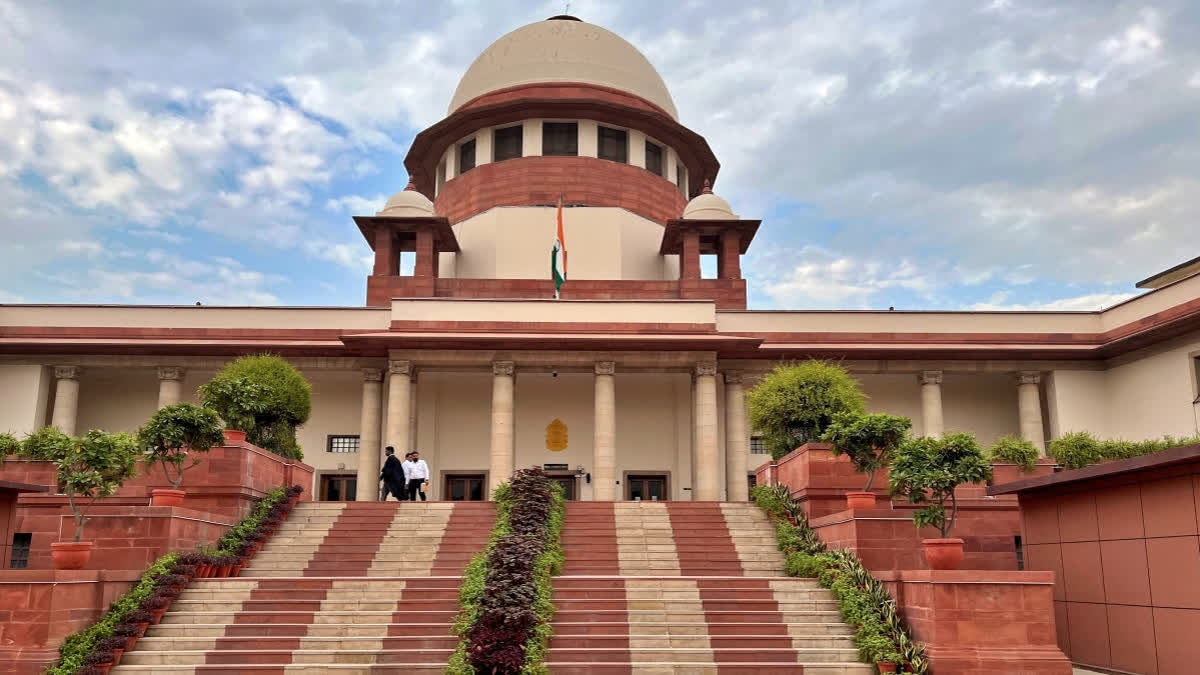New Delhi: The Supreme Court has said that a swift and efficient judiciary is a cornerstone of democracy, a bulwark against tyranny, and the guarantor of individual liberties while fast-tracking trials in civil cases pending for five years or more across the country.
A bench comprising justices S Ravindra Bhat and Aravind Kumar was considering a 41-year-old civil case, where parties were groping in the dark and litigating as to who should be brought on record as legal representative of the sole plaintiff Urmila Devi. The bench, in a judgment delivered on October 20, said this is a classic case and a mirror to the fact that the litigant public may become disillusioned with judicial processes due to inordinate delay in the legal proceedings, not reaching its logical end, and moving at a snail’s pace due to dilatory tactics adopted by one or the other party.
The apex court expressed its anguish while drawing curtains on this civil case, saying that when millions of consumers of justice file their cases by knocking at the doors of the courts of first instance, they expect speedy justice. The apex court noted that it is imperative to note that about 6 per cent of the population in India is affected by litigation, in such a scenario the courts would play an important role in the life of a nation governed by the rule of law.
Justice Kumar, who authored the judgment on behalf of the bench, said it is undisputedly accepted that the significance of a swift and efficient judiciary cannot be overstated and it is a cornerstone of democracy, a bulwark against tyranny, and the guarantor of individual liberties. “The voices of the oppressed, the rights of the marginalized, the claims of the aggrieved—all are rendered hollow when justice is deferred. Every pending case represents a soul in limbo, waiting for closure and vindication”, he said, in the 51-judgment.
Also read: SC agrees to hear NIA plea against HC granting bail to PFI members in UAPA case
The bench emphasized that it is crucial to understand that the wheels of justice must not merely turn, they must turn without friction, without bringing it to a grinding halt due to unwarranted delay. Justice Kumar said for these reasons, the system itself is being ridiculed not only by the litigant public but also by the general public, and sadly, the concept of justice delayed is justice denied is not a mere truism, but an irrefutable truth.
Expressing concern on pendency, which has cast a long shadow upon the dispensation of justice, the apex court issued a string of directions for the civil court judges to unfailingly comply with the procedural timelines laid down under the Civil Procedure Code (CPC). These guidelines are regarding summons, written statements and framing of issues, among others, and further added that the trial should proceed accordingly to the extent possible, on a day-to-day basis. The apex court asked the chief justices of all high courts to constantly monitor the progress of such trials.
Justice Kumar said we stand at a crossroads, not of our choosing but of our duty where the urgency of legal reforms in our judiciary cannot be overstated, for the pendulum of justice must swing unimpeded. “The edifice of our democracy depends on a judiciary that dispenses justice not as an afterthought but as a paramount mission. We must adapt, we must reform, and we must ensure that justice is not a mirage but a tangible reality for all”, he said.
Justice Kumar stressed, “We must streamline procedures, bolster infrastructure, invest in technology, and empower our judiciary to meet the demands of our time”. National Judicial Data Grid (NJDG) reveals that there are 11.1 million civil cases pending across the courts in the country with 22% of these cases being at least five years old.
The bench noted that delays usually happened due to procedural laxities and easy adjournments, and emphasized that proactive steps are required to not only clear the huge backlog of cases at all levels but there should be introspection by all the stakeholders so as to curtail the methods adopted to delay the proceedings.
“The time for procrastination is long past, for justice cannot be a casualty of bureaucratic inefficiency. We must act now, for the hour is late, and the call for justice is unwavering. Let us, as guardians of the law, restore the faith of our citizens in the promise of a just and equitable society”, said Justice Kumar. He said in the halls of justice, let not the echoes of delay and pendency drown out the clarion call of reform and the time is now, and justice waits for no one.
The apex court pointed out that there are review committees functional in most high courts to take stock of the case-flow management system, but the effective implementation seems to have gone into oblivion.
The bench directed that monthly statistics relating to the cases pending in each court beyond five years shall be forwarded by every presiding officer to the principal district judge, who shall collate the same and forward it to the review committee constituted by the respective high courts for enabling it to take further steps.
“The committee so constituted by the Hon’ble chief justice of the respective states shall meet at least once in two months and direct such corrective measures to be taken by the concerned court as deemed fit and shall also monitor the old cases (preferably which are pending for more than five years) constantly,” said the bench, concluding the judgment.



